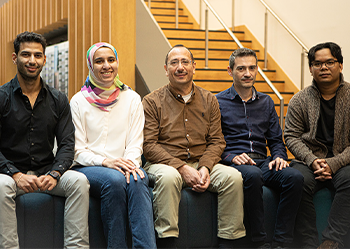University News Last updated 25 November 2024

More than 300 sensors spread across Birmingham will help researchers at Birmingham City University (BCU) analyse the impact of the city’s Clean Air Zone as part of a new ‘digital twin’ initiative.
The Clean Air Zone was launched by Birmingham City Council on 1 June 2021 to address air quality, which was identified as “the single biggest environmental risk to public health”.
“By creating an ecosystem of digital twins across the city, we’ll be able to analyse air quality data and assess the impact of the Clean Air Zone, three years after its introduction,” explained Abdel-Rahman Tawil, Professor in Software Engineering at BCU.
DIATOMIC is a partnership between BCU, Connected Places Catapult, Aston University, the University of Birmingham, Birmingham City Council, and West Midlands Combined Authority.
The initiative is funded by a £6 million UKRI Innovate UK grant.
Researchers will use the funding to develop three digital twins of Birmingham working with Siemens Advanta:
- Traffic and air quality: Birmingham City University
- Energy systems and infrastructure: University of Birmingham
- Hydrogen fuel cell electric vehicles: Aston University
“Our goal is to position Birmingham and the West Midlands as a prominent UK hub for innovation,” said Professor Tawil, a member of BCU’s Data Analytics and AI research group.
“By focusing on cutting-edge technologies, we have the potential to revolutionise industries, improve quality of life, and address environmental and health issues.
“Inclusive growth is essential. In Birmingham, we have some of the most deprived communities in the UK. We urgently need to address this societal challenge.
“We’ll share jobs, skill development opportunities, and new technologies with all communities to ensure economic development is equitable. It’s the only way we can truly thrive as a city.”
Local SMEs will be able to use DIATOMIC’s digital platform to grow their businesses.
“SMEs will be able to create their own data, integrate their data with existing data, and even create their own digital twin to run ‘what if’ scenarios,” commented Professor Tawil.
“It will help them to become more innovative as they make data-driven decisions.”
Sara Hassan, Senior Software Engineering Lecturer and BCU DIATOMIC Project Manager, added: “We’ve made great strides in the development of the Traffic and Air Quality Digital Twin (TAQ-DT) and have started demonstrating this to SMEs.
“It’s great to work with Siemens Advanta to pull the developments from different organisations into one platform that will support innovation in the region.”
Björn Burbach, Vice President, Digital Transformation at Siemens Advanta, said: "We’re proud to continue our partnership in the DIATOMIC project, leveraging our expertise in digital twin technology to develop a robust base platform that enables collaboration, monitoring and analysis of these key, university-driven digital twin use cases.
“This unified effort underscores our commitment to fostering innovation and creating cohesive digital solutions that drive progress in Birmingham and the West Midlands."
Data from the DIATOMIC project will inform government policy tackling pressing social issues.
It will also be used to create an impact assessment toolkit for SMEs to address innovation issues.
Councillor Saima Suleman, Cabinet Member for Digital, Culture, Heritage and Tourism at Birmingham City Council, said: “The DIATOMIC project is a great example of how the Council is working with city partners to drive digital innovation and supporting our local businesses and entrepreneurs to create new applications and solutions that deliver transformative services.
“It has enabled us to develop applications, such as digital twin solutions, to gain better insights and make informed decisions using data-based visualisations and predictive modelling.”
Professor Hanifa Shah, Pro-Vice-Chancellor and Executive Dean of the Faculty of Computing, Engineering, and Built Environment (CEBE), commented: “We’re not only enhancing Birmingham’s air quality but also empowering our local communities and businesses with innovative digital tools.
“By leveraging cutting-edge technologies and fostering collaboration, we can create a sustainable and equitable future for all, making Birmingham a model for urban innovation.”
DIATOMIC is supported by Digital Birmingham, which is transforming the city into a digital leader.